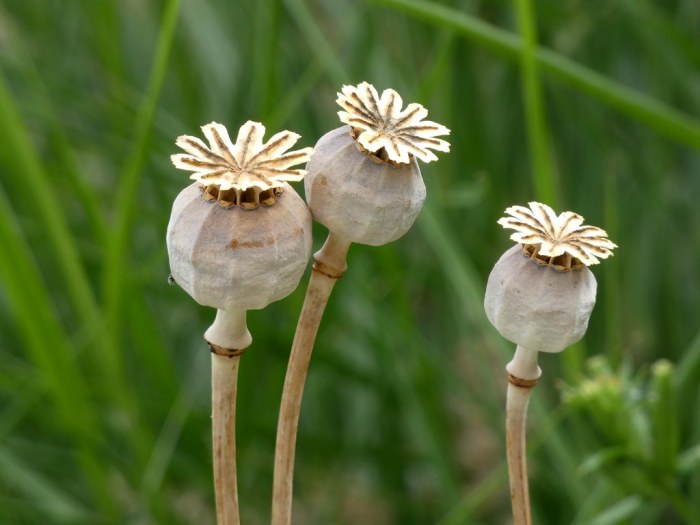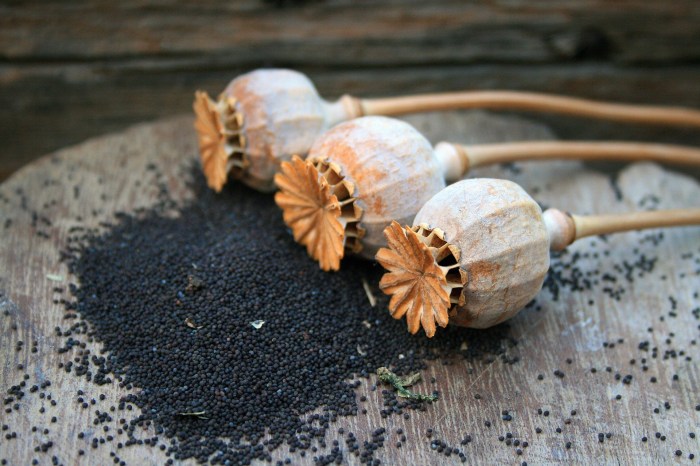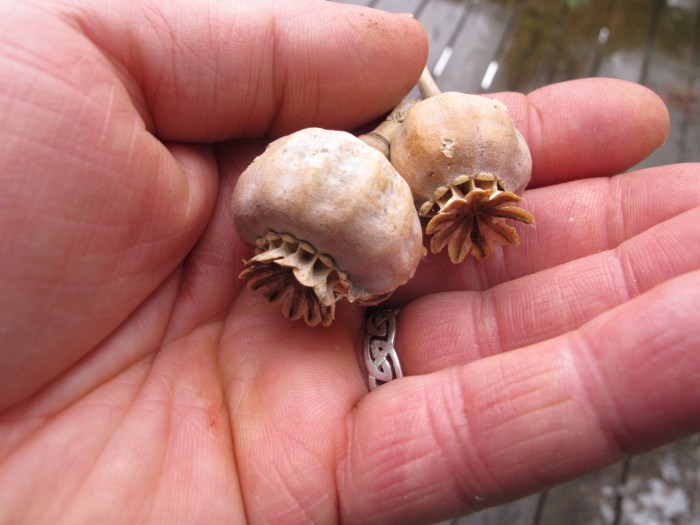Can You Plant Poppy Seed Pods?
Planting Poppy Seed Pods: A Comprehensive Guide: Can You Plant Poppy Seed Pods
Can you plant poppy seed pods – Cultivating poppy plants from seed pods presents a unique gardening experience, blending beauty with a touch of complexity. Understanding the legal aspects, growth cycle, and potential risks is crucial for successful and responsible cultivation. This guide provides a detailed overview of planting poppy seed pods, covering legality, germination, types of poppies, harvesting, and safety precautions.
Poppy Seed Pod Planting Legality

Source: staticflickr.com
The legality of planting poppy seed pods varies significantly depending on geographical location and the specific poppy variety. Regulations often differentiate between ornamental poppies, bred for their aesthetic appeal, and opium poppies, which contain opium alkaloids. Stricter laws govern the latter due to their potential for opium production. Penalties for illegal cultivation can range from fines to imprisonment, depending on the jurisdiction and the scale of the operation.
| Country/State | Legality | Restrictions | Penalties |
|---|---|---|---|
| United States (Most States) | Legal (Ornamental varieties) | Restrictions may apply to opium poppy cultivation. Licensing or permits might be required for commercial cultivation. | Fines, imprisonment (for opium poppy cultivation). |
| Canada | Legal (Ornamental varieties) | Similar to the US, cultivation of opium poppies is strictly regulated and requires licenses. | Fines, imprisonment (for opium poppy cultivation). |
| United Kingdom | Legal (Ornamental varieties) | Requires licensing for commercial cultivation of all poppy varieties. | Fines, imprisonment (for unlicensed cultivation or cultivation of opium poppies). |
| Australia | Legal (Ornamental varieties, with restrictions) | Strict regulations on opium poppy cultivation. Licenses are mandatory. | Fines, imprisonment (for unlicensed cultivation or cultivation of opium poppies). |
Poppy Seed Pod Germination and Growth
Successfully germinating poppy seeds requires attention to specific environmental factors. The process begins with preparing well-draining soil, sowing the seeds at a shallow depth, and providing consistent moisture. Optimal conditions include ample sunlight and temperatures within a suitable range for the specific poppy variety.
- Prepare the soil: Ensure the soil is loose, well-draining, and enriched with compost.
- Sow the seeds: Plant seeds about 1/4 inch deep and space them appropriately based on the mature plant size.
- Water gently: Maintain consistent moisture, avoiding overwatering which can lead to rot.
- Provide sunlight: Poppies thrive in full sun (at least 6-8 hours of direct sunlight daily).
- Thin seedlings: Once seedlings emerge, thin them to allow for adequate spacing.
A visual representation of the poppy plant’s life cycle would show a small seed germinating into a taproot, then developing a stem with leaves. The plant would then produce a bud, followed by a vibrant flower. After the flower withers, a seed pod develops, gradually maturing and drying, ultimately releasing numerous tiny seeds.
Types of Poppy Plants and Their Seeds, Can you plant poppy seed pods

Source: publicdomainpictures.net
Numerous poppy varieties exist, each exhibiting unique characteristics in flower color, size, and seed pod shape. These variations make them attractive additions to gardens worldwide. Here are a few examples:
- Oriental Poppy (Papaver orientale): Known for its large, showy flowers in vibrant colors like red, orange, pink, and white. The seed pods are typically round and hairy.
- Iceland Poppy (Papaver nudicaule): Features smaller, delicate flowers in a range of colors, including yellow, orange, and white. The seed pods are smaller and smoother than those of Oriental poppies.
- California Poppy (Eschscholzia californica): Distinguished by its cup-shaped, bright orange flowers. Its seed pods are long and slender.
Poppy Seed Pod Harvesting and Use
Harvesting mature poppy seed pods involves carefully cutting them from the plant once they have fully dried and turned brown. Proper drying and storage are essential to maintain seed viability. Beyond planting, the seeds can be used in various ways.
Planting poppy seed pods requires careful consideration of soil conditions and timing. Similar to the challenges of establishing grass in a mossy lawn, as discussed in this helpful article on can you plant grass seed over moss , successful poppy cultivation hinges on proper preparation. Just as you need to address the moss before seeding grass, you must ensure your soil is suitable for poppy seeds to germinate and thrive.
Therefore, preparation is key for both planting endeavors.
- Harvesting: Cut the seed pods carefully with shears, leaving some stem attached.
- Drying: Hang the pods upside down in a dry, well-ventilated area for several weeks until completely dry.
- Seed Extraction: Gently rub the dried pods to release the seeds. Alternatively, you can place the pods in a paper bag and crush them to release the seeds.
- Uses: Poppy seeds are commonly used as a culinary ingredient, adding flavor and texture to baked goods, salads, and other dishes. They can also be used for oil extraction.
Potential Risks and Considerations

Source: gardening-guy.com
While generally safe, handling poppy seed pods requires some precautions. Allergic reactions to poppy seeds are possible, although rare. Accidental ingestion of significant quantities of poppy seeds from certain varieties (especially opium poppies) can lead to adverse effects. Therefore, careful handling and appropriate safety measures are important.
- Wear gloves when handling large quantities of poppy seeds or pods.
- Wash hands thoroughly after handling poppy seeds or pods.
- Store poppy seeds in airtight containers away from children and pets.
- Avoid consuming large quantities of poppy seeds from unknown sources.
- If allergic reactions occur, seek medical attention immediately.
Essential Questionnaire
What are the common uses for harvested poppy seed pods besides planting?
Some people use dried poppy seed pods for decorative purposes in crafts or floral arrangements. Others may use them as a component in certain culinary preparations, though caution is advised due to potential trace amounts of alkaloids.
Are all poppy seeds the same?
No, different poppy species produce seeds that vary in size, shape, and color. The seeds also have different germination rates and growth requirements.
How long does it take for poppy seeds to germinate?
Germination time depends on the species and environmental conditions, but generally ranges from a few days to a couple of weeks.
What should I do if I suspect I have an allergic reaction to poppy seeds or pods?
Seek immediate medical attention. Allergic reactions can range from mild to severe.




















